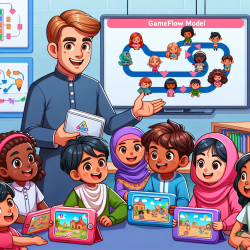As a practitioner focused on data-driven decisions, it's essential to leverage evidence-based research to improve outcomes for children. One such study, "Feasibility, Enjoyment, and Language Comprehension Impact of a Tablet- and GameFlow-Based Story-Listening Game for Kindergarteners," provides valuable insights into how digital interventions can be both enjoyable and educationally effective for young learners. This blog post will explore the key findings of the study and discuss how you can implement these outcomes to enhance your practice.
Study Overview
The research investigated a tablet-based, serious story-listening game designed for kindergarteners. The game was developed using the GameFlow model, which focuses on ensuring that digital games are both engaging and educational. The study involved 91 kindergarteners, aged 5, with a cognitive risk for dyslexia. These children played the story game for 12 weeks, six days a week, either combined with a tablet-based phonics intervention or control games.
Key Findings
- Enjoyment: The study found that the game was generally enjoyable for the children. Post-intervention questionnaires revealed that 74% of participants liked the game very much, and 66% were willing to redo the training.
- Feasibility: The game was found to be feasible for young children. The general question response accuracy (QRA) indicated a well-adapted level of difficulty, and 90% of participants completed 80% of the game.
- Language Comprehension: Preliminary results suggested that the game could foster language comprehension, particularly in children with lower baseline listening comprehension skills.
Implementing These Findings
To improve your practice, consider the following strategies based on the study's outcomes:
- Focus on Engagement: Ensure that digital interventions are enjoyable for children. Use the GameFlow model to design or evaluate games, focusing on elements like concentration, challenge, and feedback.
- Monitor Feasibility: Regularly assess the difficulty level and attrition rates of your interventions. Adjust the difficulty and duration to match the cognitive abilities and schedules of the children.
- Track Progress: Use in-game data to monitor the progress and engagement of each child. Adjust the intervention based on their initial response accuracy and story appreciation to maintain motivation.
Encouraging Further Research
While the study provides promising results, further research is needed to fully understand the impact of digital story-listening games on language comprehension. Practitioners are encouraged to conduct randomized controlled trials (RCTs) and include both literal and inferential comprehension questions in their assessments.
To read the original research paper, please follow this link: Feasibility, Enjoyment, and Language Comprehension Impact of a Tablet- and GameFlow-Based Story-Listening Game for Kindergarteners: Methodological and Mixed Methods Study.










